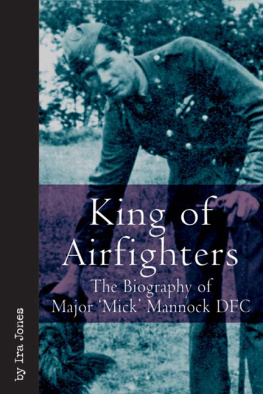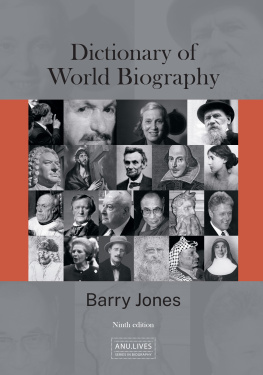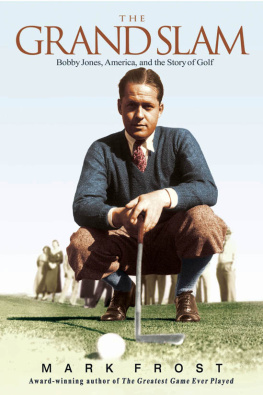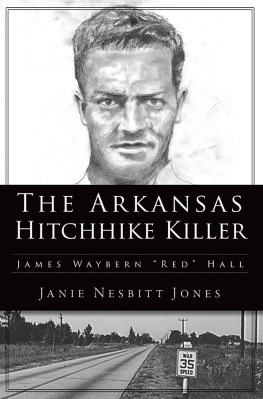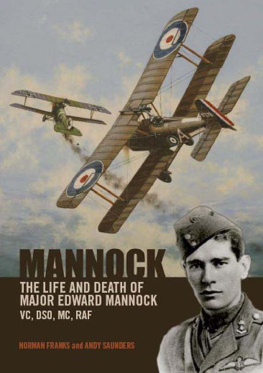

This edition of King of Airfighters is published in the United States of America in 2009 by
CASEMATE
908 Darby Road, Havertown, PA 19083
and in the United Kingdom by
CASEMATE
17 Cheap Street, Newbury, RG14 5DD

This edition Copyright 1989 & 2009 Lionel Leventhal Ltd,
Typeset & Design 2009 Casemate Publishers
ISBN: 978-1-932033-99-1
Digital Edition ISBN: 978-1-935149-77-4
Cataloging in publication data is available from the Library of Congress and the British Library.
All rights reserved. No part of this publication may be reproduced, stored in a retrieval system or transmitted, in any form or by any means, electronic, mechanical, photocopying, recording or otherwise without the prior permission of the publishers.
Printed and bound in the United States of America
908 Darby Road
Havertown PA, 19083
Publishing History:
King of Airfighters was first published by Ivor, Nicolson and Watson in 1934. It was reissued in facsimile by Greenhill Books/Lionel Leventhal Ltd in 1989. This new edition has been completely retypeset but the original language has been left unaltered.

List of Illustrations
(Appearing between pages 168 and 169)
THE AUTHOR, 1918
FAMOUS GERMAN AIR FIGHTERS AND MR. FOKKER
Fokker, Udet, von Scheich, von Richthofen, Immelman, Boelcke, Voss
BALLOON STRAFFING
FAMOUS BRITISH AIR FIGHTERS
Maxwell, Rees, Mulholland, Hawker, Lloyd, Windsor, MacDonald, Baker
FAMOUS BRITISH AIR FIGHTERS
Van Ryneveld, Rhys-David, Longcroft, Ball, Kinkead, Caldwell, Strange
H.M. THE KING CHATTING TO PILOTS OF NO. 74 SQUADRON
FAMOUS BRITISH AIR FIGHTERS
Sowrey, Beauchamp-Proctor, Barker, McCudden, Bowman, Crowe, Dallas
FAMOUS FRENCH AIR FIGHTERS
Guynemer, Nungessor, Dorm, Madon, Foncke, Coppens
VOSSS LAST FIGHT
THE AUTHOR
TO THE MOTHER OF MAJOR MICK MANNOCK, V.C.
AND ALL WAR PILOTS WHO DID NOT FAIL IN THEIR DUTY
Preface
This book presents the history of an air fighter who, to quote the citation in the London Gazette of the official award of the Victoria Cross, the highest award for valour given to our arms, was unsurpassed.
His great achievements, his noble selfless character, his manly-boyish spirits, are disclosed for the first time in this, his life-story. His was a spirit in the tradition of our people which we associate in our minds with the qualities required of a Knight of the Round Table. But this romanticised conception of the valorous hero has been so tinged by a false ideal of chivalry, from which we are unable to free our minds, that we always love to think of our heroes in these terms. If a man is brave, we assume he must be a chivalrous Galahad and Lancelot rolled into one. If he is noble, we assume he must be kind; and so on. Mannock reveals the character of the modern hero. Away from the work to which he devoted his great genius, he was all these things. Engaged in air fighting, he expunged all else from his mind, and concentrated to such purpose that he became the most feared, respected, and ruthless air fighter in the British ranks.
He was officially acknowledged by the Air Ministry to be the leading British air fighter of the war, with 73 victories. Many of these he did not officially claim, but they were known to be consistent with his achievements by his comrades and the Air Ministry representative who visited the fighting units in France for record purposes. A microscopic investigation of his achievements unquestionably places him on the throne reserved for the King of Air Fighters.
For reasons which will be explained later, the number of victories officially allocated to air fighters of the various nations can never be strictly accurate, in the same way that it is impossible to say whether Captain Albert Ball or Baron Manfred von Richthofen, the British and German aces, were destroyed by gun-fire from the ground or by their enemys machine guns from the air; but the facts themselves indicate the truth, if they do not actually state it.
Roy Browns claim to Von Richthofens death was convincing enough to his comrades in the fight, yet, to many minds, a doubt exists; and that doubt suggests a whole world of possibilities as to what actually took place during three or four minutes of the most breathlessly astonishing episodes of four long years of war between nearly all the civilised peoples of the earth. Similar doubt creeps into many of the statements made after exciting combats by a number of leading air fighters of the war, and whilst it does not always detract from the merit of their astounding achievements, it serves to throw a blazing searchlight on their characters. Of all the great fighters engaged, none exposed more frankly his modesty than Major Mick Mannock, V.C., D.S.O. thrice, M.C. twice! None showed more unashamedly the hidden depths of his true character, and none of them comes so closely to a realistic conception of what nobility of mind a character unshaped by birth or education can achieve under the most exacting stress.
To the modern schoolboy, Edward Mannock is the most inspiring figure in the Great War. His achievements may well serve as a beacon to them; a guide along the path of personal endeavour and Duty to their State.
I RA J ONES .
R OYAL A ERO C LUB ,
119 P ICCADILLY , L ONDON .
November 1934.
Introduction
Professor Werner, writing of the famous German ace, Boelcke, claims that sufficient time has now elapsed for observers to form a dispassionate judgment concerning the history of air fighting. The facts set forth in this book now enable us to see in clear perspective for the first time the place in history of one who is recognised as the greatest of all air fightersrecognised by those best qualified to judge, not only by virtue of their personal association with him during the war, but also as the result of the close examination of all facts and secret documents which have subsequently come to light.
Here he stands, his statue sculpt from the blood-soaked fields of Flanders unveiled at last that his features may remind us, not only of duty done, but of a life sacrificed to the furthering of our prowess in aerial combat.
Here he stands, perhaps the supreme example of a warrior risen from lowly beginnings, faced with the almost insuperable obstacles which militate against one of humble birth, aspiring to place himself upon that topmost rung of heroic achievementan undertaking which has so often lured men of more exalted station, endowed with equal talents and superior physical attributes. No man grips the imagination with more vigour and virile appeal to the higher senses than does this majestic figure of the Britisher, Edward Mannock, Major, V.C., D.S.O. and two bars, M.C. and bar.
The course of the war at the date when Mannock entered the conflict had
witnessed a profligate wastage of some of our finest young manhood the silly and bloody game of attrition had already been won by Germany, our diplomacy was a timid and nervous thing nothing pleased the Higher Command better than to see us mass our forces for attack in the impregnable West such was the net result of the diplomacy and the war direction and strategy pursued by the Allies during nearly two and a half years of a war in which they had started with overwhelming advantages, and through which they had been supported by unexampled efforts and self-sacrifices on the part of the peoples (David Lloyd George, War Memoirs , pp. 103-7).

